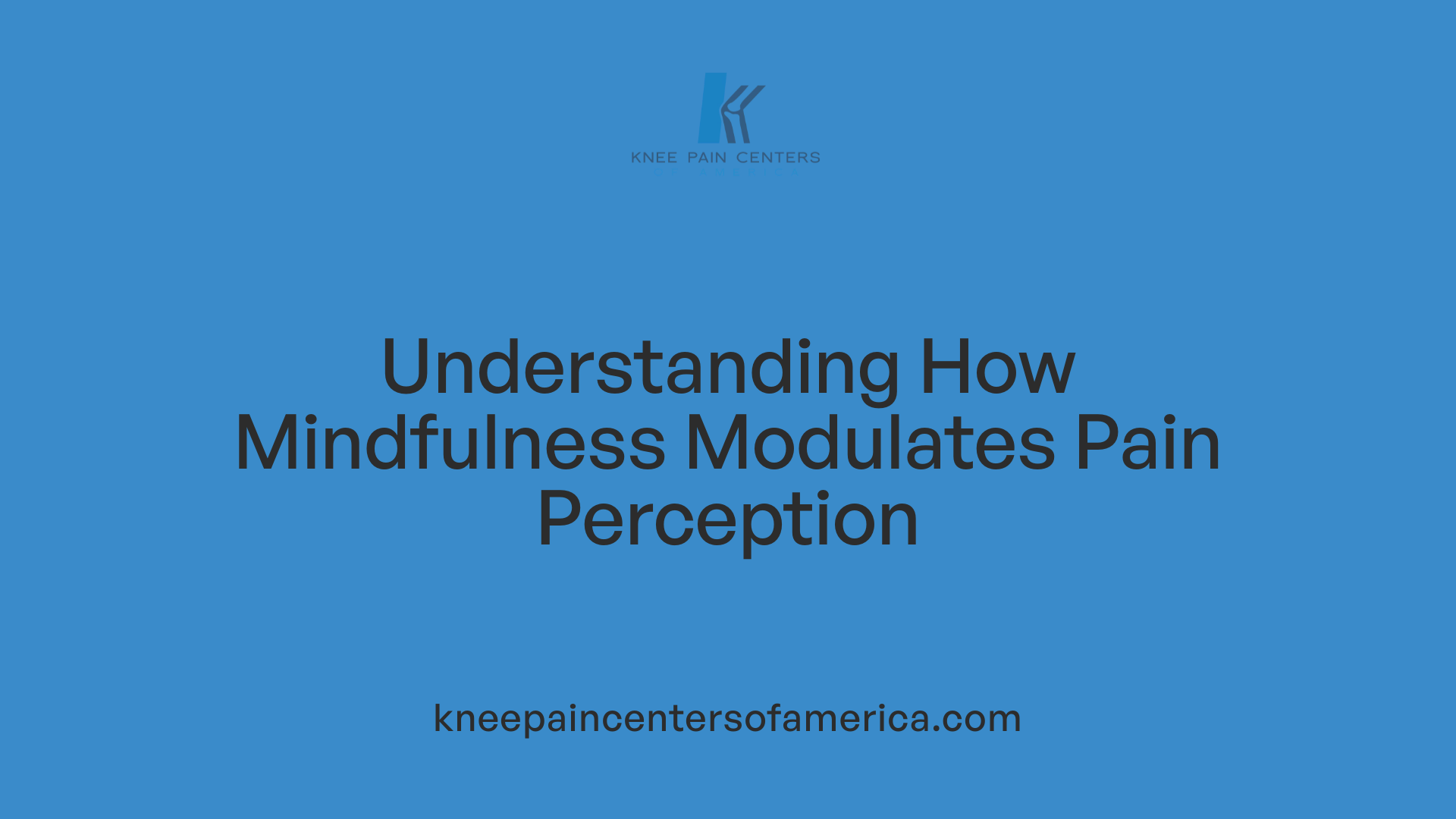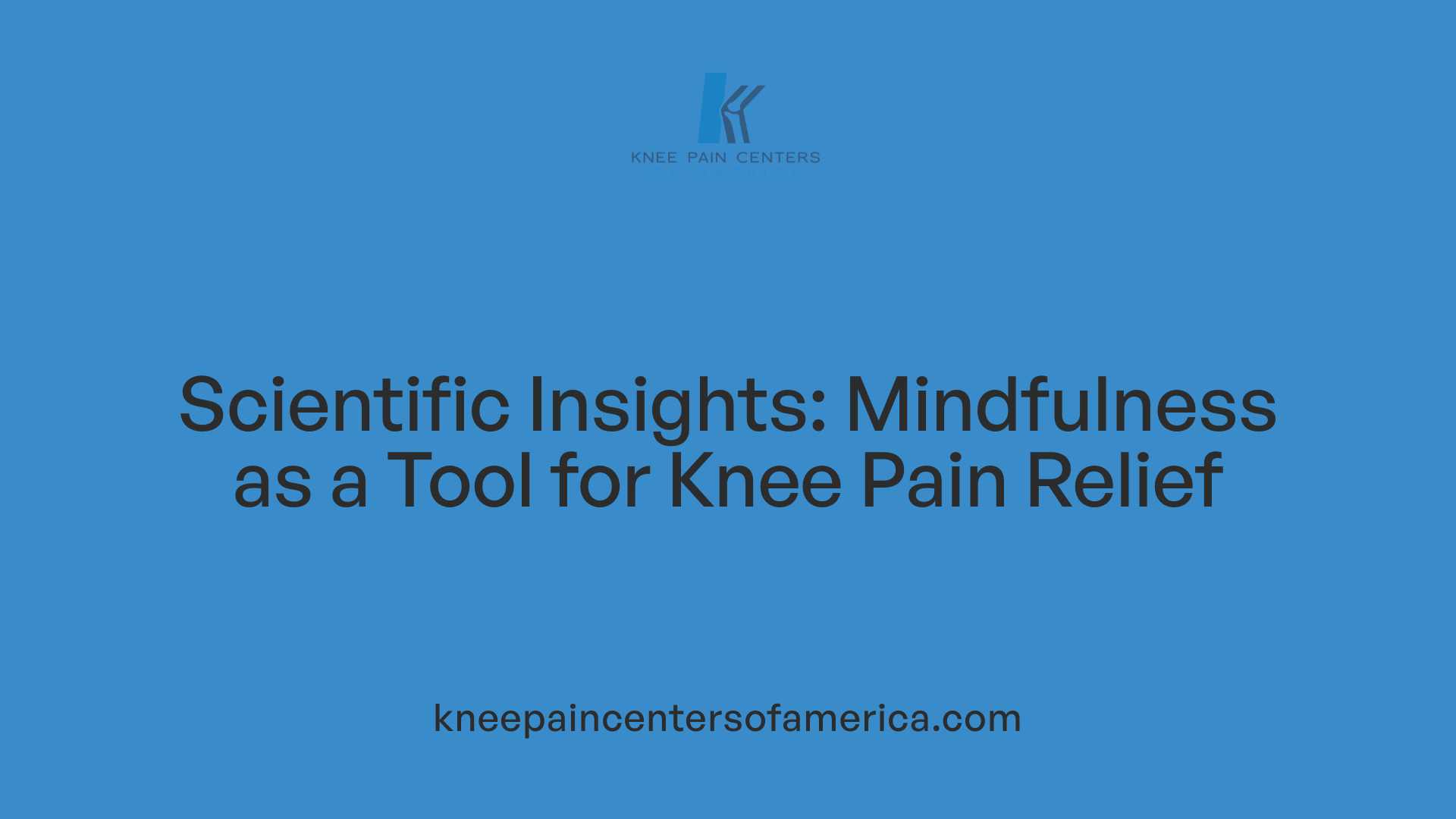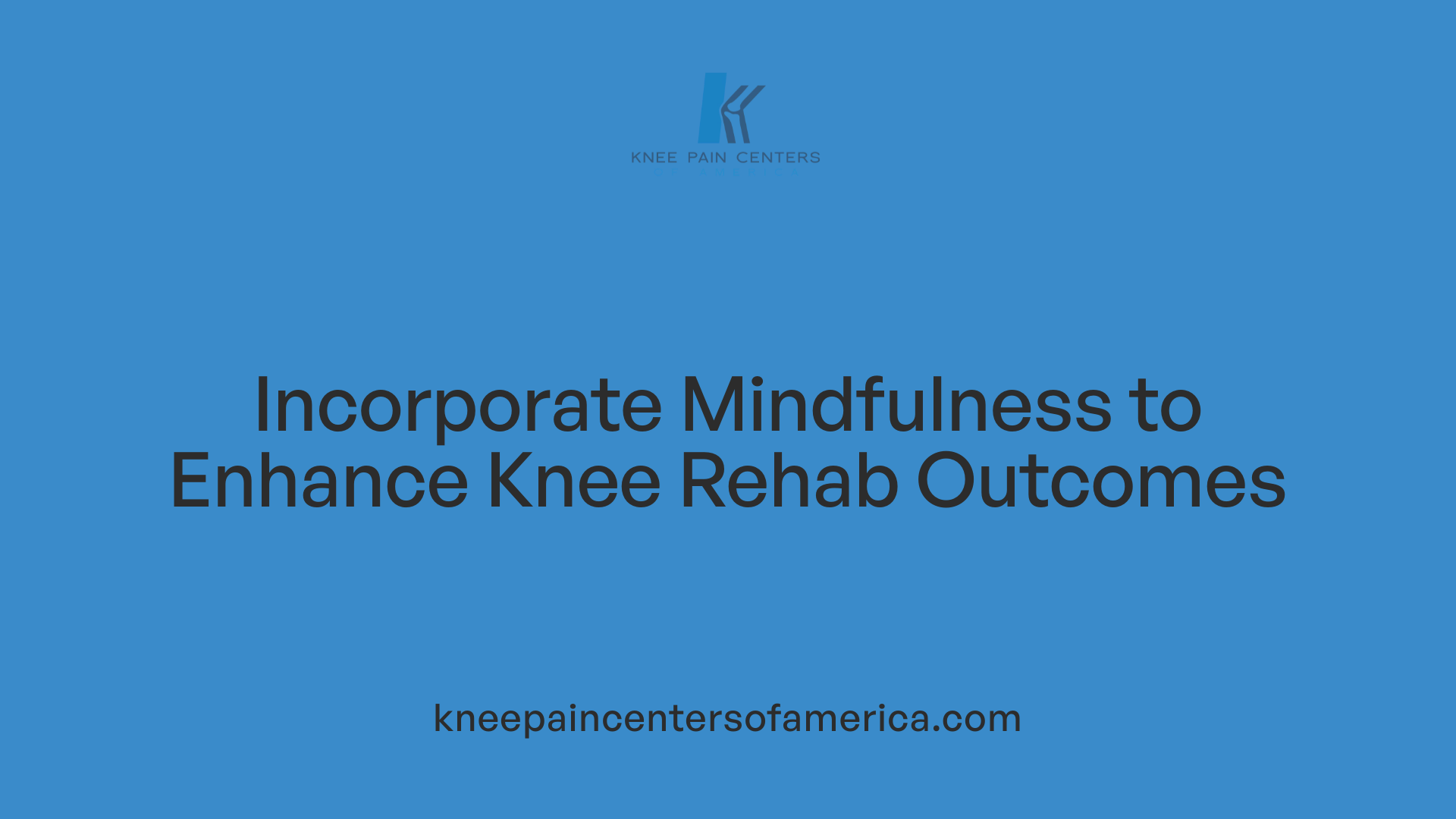Unlocking the Therapeutic Power of Mindfulness in Knee Pain Management
Knee pain, especially due to conditions like osteoarthritis, affects millions worldwide, impacting mobility and quality of life. Emerging research underscores the role of mindfulness practices as a potent complementary approach to alleviate pain, enhance mental health, and improve joint function. This article explores how mindfulness techniques—ranging from meditation to mindful movement—can be integrated into comprehensive pain management strategies, supported by scientific evidence and practical applications.
The Mechanics of Mindfulness and Pain Perception

How does mindfulness help with pain management?
Mindfulness aids in managing pain by cultivating a focused, present-moment awareness and an attitude of nonjudgmental acceptance towards sensations, thoughts, and emotions. This approach can significantly reduce the emotional distress, anxiety, and negative thoughts that often worsen the experience of chronic pain.
Practicing mindfulness through techniques like breath-focused meditation, body scans, and sensory awareness exercises can lead to meaningful changes in the brain's pain-processing regions. Scientific studies, including neuroimaging research, have demonstrated that consistent mindfulness practice can decrease activity in areas involved in pain perception, such as the anterior cingulate cortex and insula. This reduction can lower the intensity of pain signals reaching consciousness.
Moreover, mindfulness fosters neuroplasticity—the brain's ability to adapt and reorganize itself. By engaging specific neural circuits repeatedly, mindfulness can strengthen pathways associated with pain modulation and cognitive control, helping individuals reframe their experience of pain.
Techniques like deep, diaphragmatic breathing (e.g., the 4-7-8 method), body scans that promote awareness of physical sensations, and gentle movement exercises like yoga or tai chi, activate the parasympathetic nervous system, creating relaxation and reducing stress hormones that exacerbate pain.
This neuroplasticity means that the brain can rewire its responses to pain over time, making individuals more tolerant and less reactive to discomfort. Essentially, mindfulness helps transform the relationship with pain from one of fear and avoidance to one of acceptance and understanding, which can diminish overall pain perception and improve emotional well-being.
Scientific Evidence Supporting Mindfulness for Knee Pain Relief

What scientific evidence supports the effectiveness of mindfulness for knee pain relief?
Research has increasingly shown that mindfulness practices can be beneficial for those experiencing knee pain, especially related to osteoarthritis. Several clinical trials and studies demonstrate that engaging in mindfulness can lead to meaningful reductions in pain levels and improvements in joint function.
One notable study involved an 8-week mindfulness-based intervention that resulted in a 42.6% reduction in knee pain ratings and a 47.7% improvement on the WOMAC pain scale. Participants also experienced nearly a 45% overall enhancement in their knee function and reported better mood and sleep quality.
In addition, systematic reviews of multiple trials, such as a 2017 analysis of 38 studies, find that mindfulness meditation can improve chronic pain symptoms, depression, and overall quality of life. For instance, neuroimaging research from UC San Diego documented a 32% decrease in pain during meditation sessions, alongside brain activity changes in pain-processing areas.
Another important piece of evidence stems from a meta-analysis of five randomized controlled trials examining postoperative pain after knee or hip replacement surgeries. The analysis showed that mindfulness-based interventions significantly reduced pain scores—highlighting the practicality of such approaches in both chronic and postoperative pain scenarios.
While some studies, like one on Mindfulness-Based Stress Reduction (MBSR) programs, have shown delayed but notable benefits on pain perception, others underscore improvements in related symptoms such as stress, anxiety, and mood disturbances, which often exacerbate pain sensations.
Overall, these findings are supported by scientific literature indicating that mindfulness changes how the brain perceives pain, activates pain control centers, and lessens the emotional distress associated with chronic pain. Although ongoing research aims to refine these approaches, current evidence strongly endorses mindfulness as a practical, nonpharmacologic option for knee pain management.
| Study / Review | Main Findings | Implications |
|---|---|---|
| 8-week meditation program | 42.6% pain reduction, improved function | Effective short-term relief |
| 2017 systematic review | Improved pain, mood, quality of life | Supports mindfulness for chronic pain |
| Neuroimaging study | 32% pain decrease during meditation | Brain restructuring involved |
| Postoperative pain meta-analysis | Reduced pain scores after joint surgery | Useful in surgical recovery |
These findings suggest that integrating mindfulness into pain management routines could offer a safe, effective complement to traditional therapies, helping individuals live more comfortably with knee issues.
Integrating Mindfulness into Knee Rehabilitation Programs

How can mindfulness practices be integrated into rehabilitation or pain management strategies for knee conditions?
Incorporating mindfulness into knee rehabilitation offers a comprehensive approach that benefits both physical recovery and mental well-being. One practical method involves embedding mindfulness techniques such as body scan meditation and mindful breathing into physical therapy sessions. For instance, therapists can guide patients to focus on specific sensations within their knees during exercises, encouraging a non-judgmental awareness that helps alleviate pain-related stress.
Patients are also encouraged to adopt self-care routines that involve daily mindfulness practices. These might include guided imagery exercises, gentle movement-based mindfulness like yoga or tai chi, and breathing exercises such as the 4-7-8 technique. Regular practice can help patients become more attuned to their body sensations, recognize early signs of discomfort, and respond with calmness rather than frustration.
Mindfulness-based stress reduction (MBSR) programs specifically designed for chronic musculoskeletal conditions have been effective in reducing pain perception and emotional distress. These programs typically involve weekly sessions, combining meditation, body scans, and gentle movements to foster acceptance and resilience.
Research underscores the synergy between mindfulness and physical therapy, noting improvements in pain tolerance and emotional responses. When integrated thoughtfully, mindfulness helps patients shift their focus from pain avoidance to acceptance, improving adherence to physical activity and enhancing overall outcomes.
In summary, combining mindfulness strategies with traditional rehabilitative practices promotes a dual benefit: physical healing through targeted exercises and mental resilience through stress reduction. This holistic approach encourages a more positive outlook, reduces fear of movement, and supports long-term management of knee osteoarthritis.
The Broader Benefits of Mindfulness on Mental and Emotional Well-Being

What mental health benefits are associated with mindfulness for individuals experiencing knee pain?
Practicing mindfulness offers substantial mental health advantages for those suffering from knee pain. Chronic pain conditions, such as osteoarthritis, often bring about heightened levels of stress, anxiety, and depression. Mindfulness helps mitigate these emotional challenges by encouraging individuals to focus on the present moment without judgment, fostering a sense of calm and acceptance.
By actively engaging in mindfulness exercises like breathing techniques, body scans, and mindful movement, individuals can better regulate their emotions and reduce negative thought patterns related to pain. This emotional regulation enhances resilience and promotes a more positive outlook, which is crucial for coping with ongoing discomfort.
Research indicates that mindfulness can also decrease symptoms of anxiety and depression linked to chronic conditions. It improves mood stability and increases emotional flexibility, helping individuals react more adaptively to pain and stress. Additionally, mindfulness fosters self-compassion, reducing feelings of frustration and helplessness often associated with persistent pain.
In turn, these mental health benefits support overall well-being and can indirectly enhance physical rehabilitation efforts. When emotional distress diminishes, patients are more likely to engage in prescribed therapies and maintain healthier behaviors. Integrating mindfulness into pain management routines, therefore, not only alleviates psychological suffering but also promotes a more holistic approach to healing.
In summary, mindfulness practices can significantly elevate mental health for those with knee pain by reducing tension, fostering acceptance, and improving mood. These benefits contribute to a better quality of life, enabling individuals to manage their condition with greater resilience and emotional stability.
Practical Guidelines and Recommendations for Incorporating Mindfulness

What techniques are recommended for managing knee pain through mindfulness?
Mindfulness-based approaches offer various techniques that can help manage knee pain effectively. Specific practices such as mindful breathing, body scans, and gentle movements like tai chi or yoga are highly recommended. These methods foster awareness of physical sensations and promote relaxation, which can alleviate pain and improve overall well-being.
Practicing mindfulness and relaxation techniques, including meditation and breathing exercises, can significantly change how the brain processes pain signals. These techniques activate brain areas involved in cognitive control while deactivating regions associated with pain perception, helping to reduce the experience of pain.
Incorporating mindfulness into daily routines can enhance pain management, especially when combined with medical treatments. Creating a personalized mindfulness plan tailored to individual needs and challenges supports consistent practice. Support from professionals, friends, or mindfulness groups can assist in overcoming obstacles.
Achieving long-term benefits from mindfulness requires consistency, patience, and commitment. Regular practice, even in small doses, fosters neural flexibility and rewires responses to pain, leading to lasting improvements.
Adopting these techniques as part of a comprehensive approach to knee pain—integrating physical therapy, medication, and psychological strategies—can maximize relief and improve the quality of life for adults with osteoarthritis or chronic knee discomfort.
Embracing a Mindful Approach for Better Outcomes
The integration of mindfulness practices into knee pain management offers a promising avenue for not only reducing pain intensity but also fostering mental resilience and emotional well-being. Scientific research confirms that mindfulness interventions—such as meditation, mindful movement, and breath work—can modify brain pathways involved in pain perception, leading to real, measurable improvements. When incorporated into rehabilitation strategies, these practices help patients develop better pain acceptance, decrease fear of movement, and improve overall quality of life. As awareness of mindfulness continues to grow, resources like guided sessions, apps, and group programs make it accessible to many. By embracing a mindful approach, individuals suffering from knee pain can pursue a more balanced, less stressful path to recovery—one that addresses both body and mind for holistic healing.
References
- Effects of Meditation on Symptoms of Knee Osteoarthritis - PMC
- Mindfulness to cope with chronic pain - Mayo Clinic Health System
- Adding Mindfulness Practice to Exercise Therapy for Female ...
- Benefits of Mindfulness and Relaxation Techniques for Pain Relief
- Using Mindfulness for Pain Management - UMass Memorial Health
- The Power of Mindfulness: Easing Arthritis Pain and Improving ...
- Meditation: Benefits for People with Arthritis
- Can Mindfulness Help with Pain Management? - Psychiatry.org
- Mindfulness-based intervention for non-farmacological pain control ...





